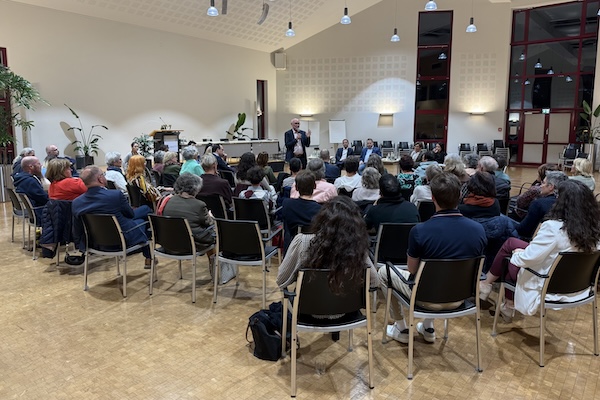 Credit: Ievgenii Karanov, Chronicle.lu
Credit: Ievgenii Karanov, Chronicle.lu
On Thursday 30 October 2025, the telephone helplines of the Greater Region marked fifty years of crisis support with a joint training session at the CEFOS training centre in Remich for around 120 volunteers.
The anniversary programme also included a special thematic focus and a press briefing with representatives of the Luxembourg, Trier and Saarbrücken services, highlighting cross-border cooperation and the continued commitment of volunteers. Participants from neighbouring regions exchanged experiences on the core values of their work, demonstrating that despite different organisational structures, this form of support transcended borders and reflected shared values that help shape society.
Participants included Luxembourg’s Minister for Family Affairs Max Hahn, Saarland’s Minister for Social Affairs Dr Magnus Jung, Michaela Tholl, Head of the Engagement Development Team in the Diocese of Trier, and Frank Ertel, Protestant Director of Telephone Counselling in Germany.
Professor Dr Tatjana Schnell opened the discussion with an introductory presentation on the day’s findings, while the event was moderated by Roman Glauben, former member of the Saarland State Chancellery and moderator of regional development projects.
Tatjana Schnell opened the discussion by highlighting the human and societal value of telephone counselling: “People learn to listen. And through listening, something happens to them. This is not about indoctrination but about learning by engaging with the world and by realising that even dark sides can be transformed into something good.” She added that listening creates both trust and meaning, concluding that telephone counselling “is a model for society, showing what happens when we listen instead of speak.”
Michaela Tholl reflected on her early experience as a volunteer and how it shaped her outlook: “It taught me to approach people again and again without preconceptions. Sometimes the first impression is wrong, it turns out quite differently.” She also underlined the need for authenticity in politics and society: “What I wish for society is that there are real people. It isn’t easy to live this ‘realness’ in politics, because it means making oneself vulnerable. But this is the path by which people who feel lonely can sense: I am part of a community.”
Dr Magnus Jung stressed the importance of recognising and supporting volunteers: “Those who volunteer need space and time to reflect on themselves and their motivations, because this provides orientation and strengthens their resolve.” He described their work as “an expression of neighbourly love” and noted that despite rising aggression and polarisation, “there are many well-intentioned and compassionate people who may not shout as loudly, but they are there. On them we base our hope that things will turn out well.”
Minister Hahn, praised the cross-border collaboration and commitment of volunteers: “You try to make a difference for people who need you. You are there, and you do something that absolutely makes sense.” He added: “It does a lot of good to know there are people for whom it matters how others are doing. You give the most valuable thing you have - your free time - to help others.” Concluding, he called for empathy and dialogue: “Let’s multiply what we experienced today - taking time to listen to one another and to care how others are doing.”
The event concluded with informal exchanges and networking, as participants and guests continued discussions on cross-border cooperation and volunteer practice.








